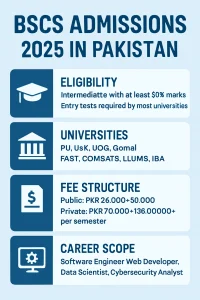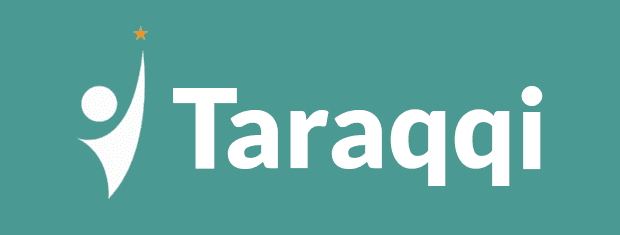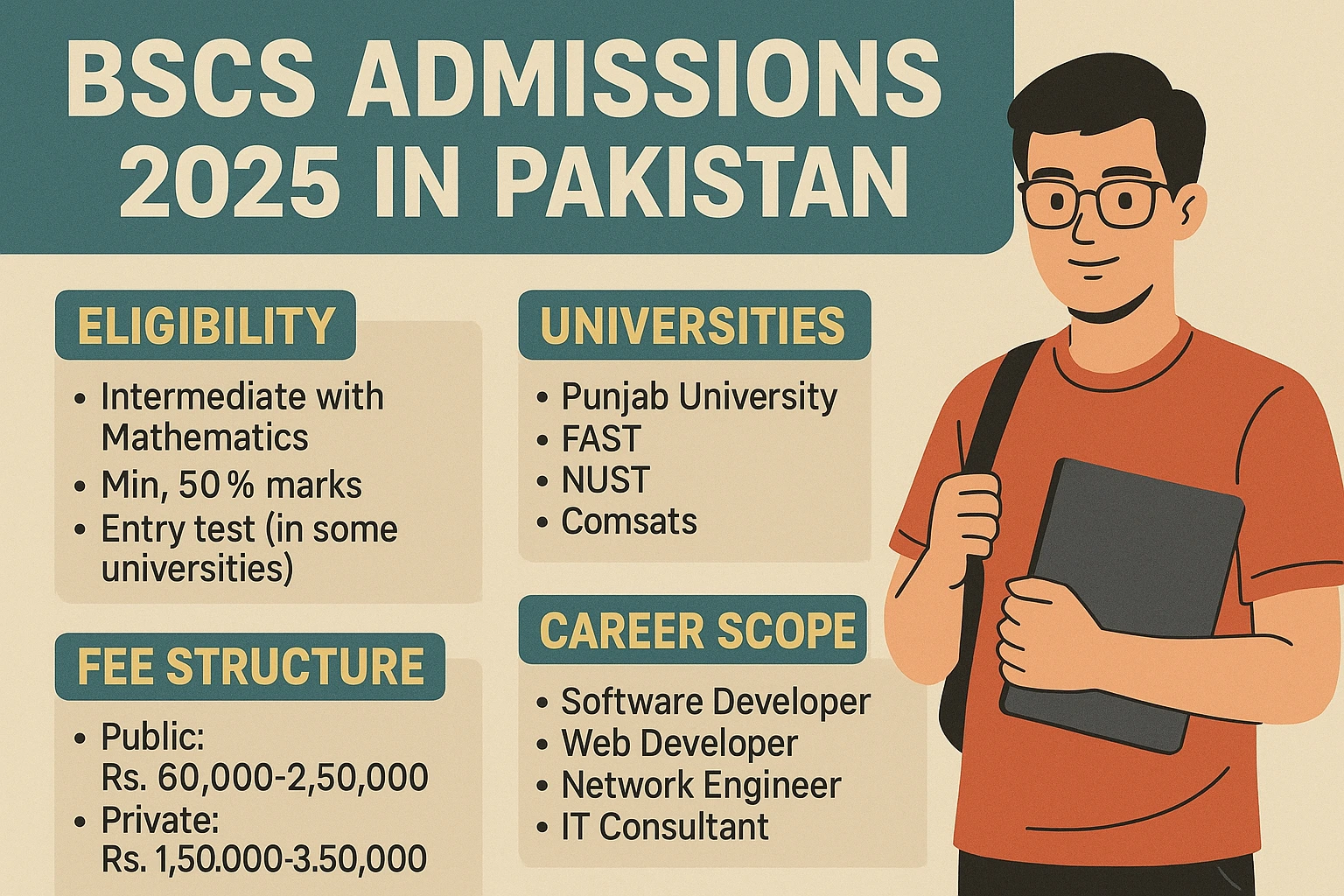BSCS Admissions 2025 in Pakistan – Eligibility, Universities, Fee Structure & Career Scope
The Bachelor of Science in Computer Science (BSCS) is one of the most in-demand undergraduate programs in Pakistan, preparing students for careers in software development, artificial intelligence, cybersecurity, and other IT fields.
In 2025, the demand for skilled computer science graduates continues to grow due to the rapid expansion of Pakistan’s tech industry, freelancing opportunities, and international IT outsourcing.
This guide covers BSCS admissions 2025 in Pakistan, including eligibility criteria, top universities, fee structures, career prospects, and expert tips to help students secure admission to their desired institute.
Why Choose BSCS? (Demand, Careers, Industry Scope)
Choosing BSCS is more than just pursuing a degree — it’s investing in a future-proof career.
- High Job Demand: The IT industry in Pakistan is expanding, with thousands of jobs available for software engineers, data analysts, and IT managers.
- Global Opportunities: BSCS graduates can work remotely for international companies, increasing earning potential.
- Freelancing Growth: Many BSCS students start freelancing while studying, building skills and income streams early on.
- Entrepreneurship Potential: With coding and problem-solving skills, graduates can launch their own startups or tech solutions.
Admission Requirements & Eligibility Criteria
While eligibility varies slightly between universities, most Pakistani institutions offering BSCS have the following requirements:
Educational Qualification:
- FSc (Pre-Engineering) / ICS with Mathematics / A-Levels with Math & Computer Science / Equivalent qualification recognized by HEC
- Minimum 50% to 60% aggregate marks (varies by university)
Additional Requirements:
- Some universities require entry tests (ECAT, NTS, university-specific tests).
- Foreign students must provide an equivalence certificate from IBCC.
Best Universities to do BSCS in Pakistan (Public/Private)
Public Sector Universities
- Punjab University College of Information Technology (PUCIT) – Lahore
- NUST – Islamabad
- University of Karachi – Karachi
- University of Peshawar – Peshawar
- Quaid-e-Azam University – Islamabad
Private Sector Universities
- FAST-NUCES – Multiple Campuses
- COMSATS University – Multiple Campuses
- Lahore University of Management Sciences (LUMS) – Lahore
- Bahria University – Islamabad & Karachi
- Iqra University – Karachi & Islamabad

Admission Process (Step-by-Step Guide)
- Check Eligibility – Review the academic and test requirements for your chosen university.
- Register Online – Most universities have online application portals.
- Submit Documents – Include academic transcripts, CNIC/B-Form, and photographs.
- Pay Application Fee – Payment can usually be made via bank challan or online transfer.
- Appear in Entry Test – Prepare according to the university’s syllabus and test format.
- Check Merit List – Monitor the university website for admission results.
- Complete Fee Submission – Secure your seat by paying the admission fee within the deadline.
Fee Structure Comparison (Public vs Private)
| Type | Annual Fee Range (PKR) |
|---|---|
| Public Universities | 40,000 – 120,000 |
| Private Universities | 180,000 – 500,000+ |
- Public universities are budget-friendly but have higher merit requirements.
- Private universities are more expensive but often offer flexible admission criteria and modern facilities.
Entry Test Requirements (ECAT, NTS, University Tests)
- ECAT: Required for engineering and some BSCS programs in Punjab.
- NTS (NAT/ GAT): Used by various universities for admission assessment.
- University-Specific Tests: FAST, NUST, COMSATS, and others conduct their own computer-based entry exams.
Test Subjects Typically Include:
- Mathematics
- English
- Analytical Reasoning
- Basic Computer Science
Merit Calculation Formula
Each university has its own merit calculation, but a common formula is:
Merit Score = (Matric Marks × 10%) + (Intermediate Marks × 40%) + (Entry Test Marks × 50%)
Some universities give weightage to O/A Levels differently, so check their official policy.
Scholarships & Financial Aid Options
- HEC Need-Based Scholarship – Covers tuition and living expenses for deserving students.
- University Merit Scholarships – Awarded to top scorers in entry tests or previous academic records.
- PEEF Scholarships – For Punjab domicile students meeting merit and income criteria.
- Private Scholarships – Offered by organizations like Telenor, PTCL, and IT companies.
Career Opportunities after BSCS
BSCS graduates can pursue diverse career paths, such as:
- Software Developer
- Web & Mobile App Developer
- Data Scientist
- Artificial Intelligence Engineer
- Cybersecurity Specialist
- Game Developer
- IT Project Manager
- Academic & Research Roles
With Pakistan’s IT exports crossing $3 billion in recent years, opportunities are expanding rapidly.
BSCS vs BSE, BSIT, BSSE (Comparison Table)
| Degree | Focus Area | Best For |
|---|---|---|
| BSCS | Theory + Practical Programming | Students who want coding + theory mix |
| BSE | Software Development Processes | Those aiming for software engineering careers |
| BSIT | IT Systems & Networking | Students interested in IT support & systems |
| BSSE | Software Engineering Principles | Future software architects & project managers |
Final Tips for Admission Success
- Start preparing for entry tests at least 3–4 months in advance.
- Apply to multiple universities to increase admission chances.
- Keep an eye on deadlines – missing them can cost you a whole year.
- Explore scholarship options early.
- Build basic programming skills before starting the degree to stay ahead.

